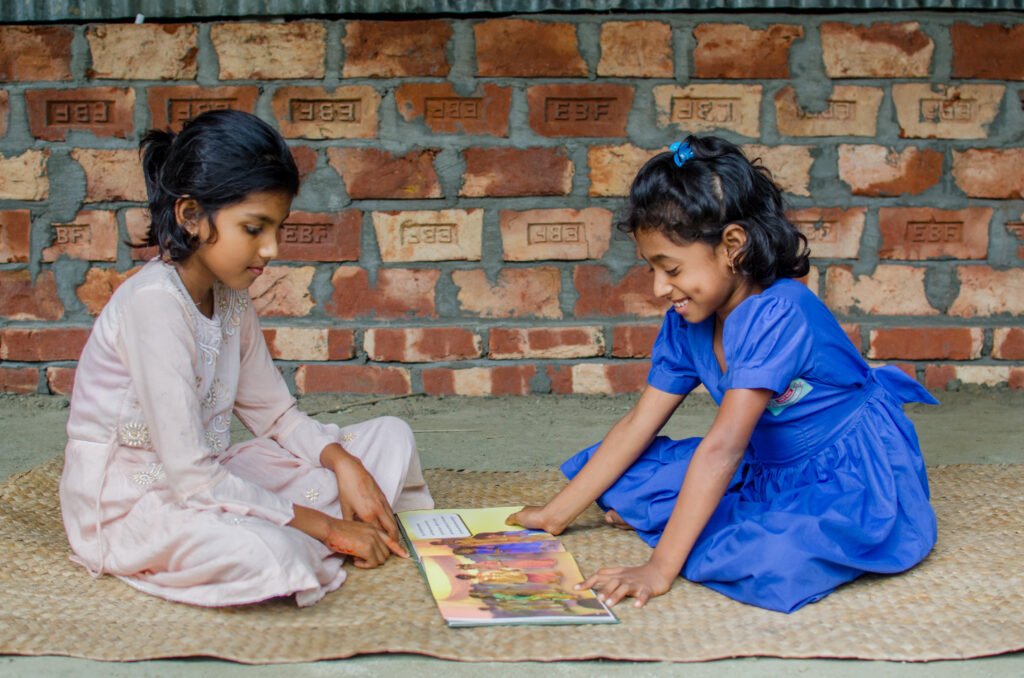Niketan
Niketan, a Dutch development organisation, works with Disabled Rehabilitation and Research Association (DRRA) in rural areas and informal settlements in Bangladesh. The work aims to improve the quality of life of children and youth with cerebral palsy and other complex disabilities, who are often left out of other organisations’ programmes.
The project provides a holistic support package to learners across age groups for as long as they require it. This includes physical, cognitive, socio-emotional, and educational support. In practice, this means providing a range of early interventions, community care programmes, physiotherapy, assistive devices, daily living skills training, special and inclusive education, pre-vocational training, and job placements. Home-based support, provision of healthy meals, and reimbursement of travel expenses to access rehabilitation or education may also be offered. Families and local government authorities actively engage throughout this process.
Care and education during the pandemic
During the pandemic, we provided families and staff members with COVID-19 safety kits, including gloves, masks and soap. The physiotherapists and teachers we employ contacted children and their parents regularly using WhatsApp, Facebook Messenger, or phone calls, to find out how they were doing. These conversations and text messages were also an opportunity to inform families about the local COVID-19 situation and advice.
Phones became the main way to enable parents to support their children’s home learning experiences. We made short video clips of activities that parents should practise with their children. These activities linked with the school’s curricula and continued the children’s cognitive and social-emotional learning. Many parents sent short video clips in return, proudly showing what they had been doing with their children.
Veranda schools
Where possible, small groups of 5-10 children, in shifts and wearing facemasks, received face-to-face education and physiotherapy. Community members volunteered to provide space on their verandas, mats to sit on and other low-cost local materials. Two community development organisers and an assistant physiotherapist supported several veranda schools. Activities were based on the individual needs of each child. Parents were trained to continue the rehabilitation and education activities at home, supported by WhatsApp or phone messages and video clips. The veranda schools were very effective and rapidly increased to 54 villages.
We continue to run veranda schools to embed disability care and education sustainably into the local community. The process is decreasing disability-related stigma, making communities more inclusive. By providing care and education close to their homes, children with complex disabilities have become visible to the community as children who need care, love and friends like other children. It also demonstrates that disability is not transferable and does not imply inability, and that children with disabilities can participate in the community with some support.
Financial support
Every family was affected differently by the COVID-19 crisis. Each family was considered on a case-by-case basis, focusing on their living space, access to finances, and food. There were serious concerns about the loss of jobs, especially for daily wage-earners in the informal economy, such as rickshaw pullers, street vendors, construction workers, and garment factory workers.
Continuing care and education for children with disabilities was critical, but it was important not to forget their close relatives. The whole family was affected by the pandemic and needed support to survive. Niketan did something it had never done before: providing cash transfers to individual families. In addition to the distribution of food packages, a pilot scheme was started to provide money to families for three months. We wanted to allow each family to make its own decision on what to use this money for. We found that 87% of the families were able to generated new income from this cash transfer. For example, some families decided to buy livestock or sewing machines. The families who bought seeds or rickshaws were the most successful.
Online training
Niketan started to develop open-source practical modules on YouTube to help parents and others to support children with disabilities. They were aimed at families living in remote areas without access to a rehabilitation centre. The topics include “Feeding a child with cerebral palsy”, “Problems of reflux and drooling in children with complex disabilities” and “Gross motor skills”. They are useful and were used regularly during the COVID-19 crisis in Bangladesh, Nepal, India, Pakistan, and Sri Lanka. More modules are being developed, such as one on communication.

Stories for inclusion
Niketan and DRRA already worked with primary schools to promote inclusive education. During the height of the pandemic, we looked at developing new ways to promote inclusion. Storybooks were developed to address the fact that children without disabilities are often unaware of the difficulties their peers with disabilities face because they rarely meet or read about these children. The first book, “My name is Runa” is written in Bangla. It tells the true story of Runa from Bangladesh who has cerebral palsy. The book highlights her positive and negative experiences of growing up.
We also developed an Activity Guide and Talking Posters for teachers to use in the classroom to engage children with the story and increase awareness, understanding and acceptance of disability diversity. Talking Posters are enlarged illustrations from the book with questions to help teachers guide classroom discussions.
With thanks to the Niketan and DRRA teams, especially Farida Yesmin and Md Nizam Uddin. For more information, contact Antoinette Termoshuizen: info@niketan.nl
